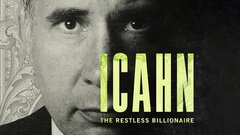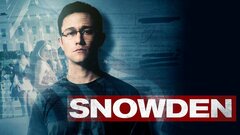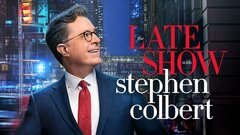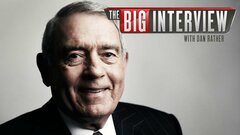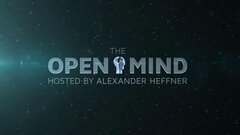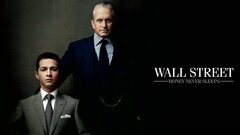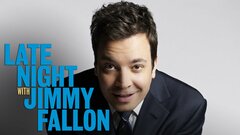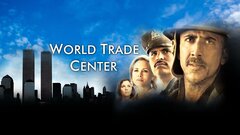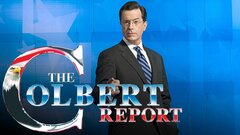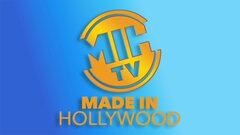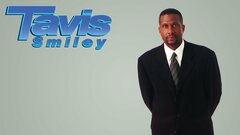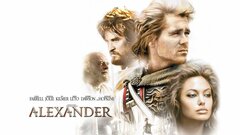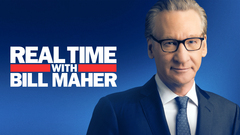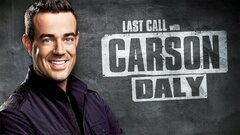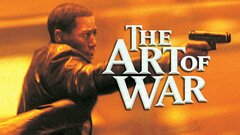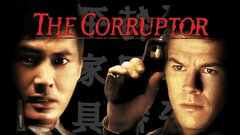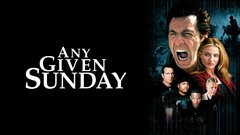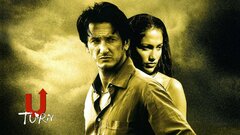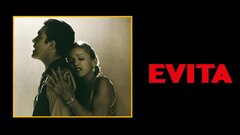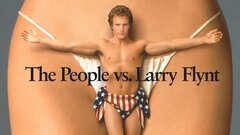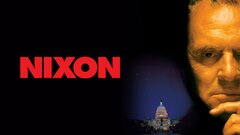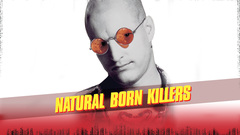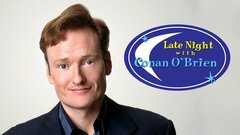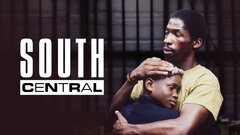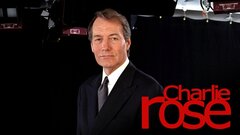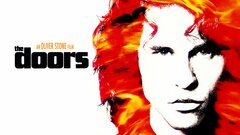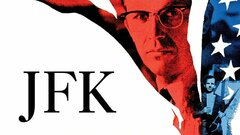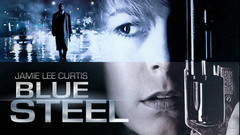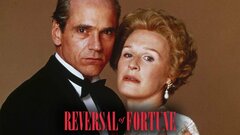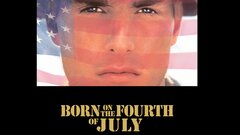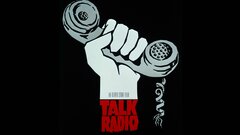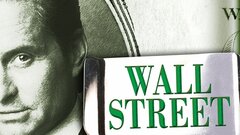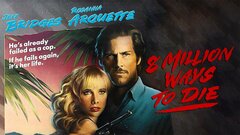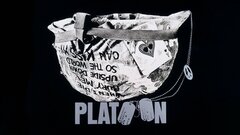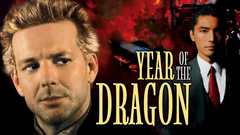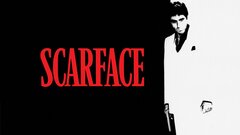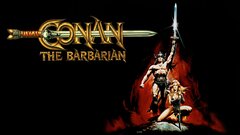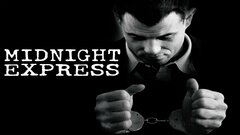Perhaps one of most controversial and politically-charged directors of his generation, Oliver Stone has made some of the most seminal and enduring films of any time. With one foot consistently in the 1960s, Stone traveled back in time on numerous films to present his unflinching take on a turbulent time wrought with sex, drugs and an endless war. Though he directed his first film in 1974 and earned an Academy Award for screenwriting four years later, he would have to wait until "Platoon" (1986) in order to gain name recognition and industry respect.
But once he was on the map, Stone made a string of exceptional films that cemented his place as one of Hollywood's most unique and compelling directors, thanks to "Wall Street" (1987), "Born on the Fourth of July" (1989) and "J.F.K." (1991). He was a man uniquely concerned with the destructive actions of the country he loved. Though some of his films veered in focus - namely "Natural Born Killers" (1994), "U-Turn" (1997) and "Alexander" (2004) - there was no doubting Stone's well earned place in cinematic history.
Born Sept. 15, 1946 in New York, NY, Stone was the only son of Louis, a successful stockbroker in the 1950s and 1960s, and Jacqueline Goddet, a banker's daughter. The couple met in post-World War II Paris while Louis served as a colonel on General Dwight D. Eisenhower's staff. Though brought up in a well-to-do environment, Stone's upbringing was anything but easy. A lonely child, Stone was educated at Trinity School before his parents shipped him off to The Hill School in Pottstown, PA. It was during this time that he learned about his father's numerous affairs with the wives of family friends, resulting in his parents getting divorced when he was 15. When Stone turned 16, his father hired a prostitute for him so he could lose his virginity. After leaving The Hill School, Stone enrolled at Yale University in 1965, where he was classmates with future president and political adversary, George W. Bush. Afraid he was on a fast track to becoming just another business executive on Wall Street - and fueled by the adventurous life of Polish novelist Joseph Conrad - he dropped out of Yale to teach English in Saigon, Vietnam.
Despite uncertainty about his future, Stone knew he was digging the well from which he would later draw his creativity. Only then, he thought his main creative outlet would be writing novels. Nonetheless, Stone spent his time in Saigon carousing with all manner of miscreants - namely sailors and prostitutes. His soul quickly became restless again, however, so he soon joined the U.S. Merchant Marines, which led him down the coast from Oregon to Mexico. It was in Guadalajara, that he holed himself up in a hotel room, living off his life savings and writing a 1,400-page autobiographical novel based on his unusual relationship with his mother. He returned to Yale and began shopping his opus to a few publishers, all of whom rejected it. Torn by anger and grief, Stone threw part of the novel into the New York's East River and burned the rest. With mad thoughts of killing somebody - including himself - Stone did the unthinkable: he enlisted in the Army to fight in Vietnam. Though he was offered Officer Candidate School, Stone insisted that he serve in the Infantry in order to see combat. In September 1967 - the day before his 21st birthday - Stone was on a plane back to Vietnam.
It took about a day of being in the bush for Stone to realize that he had made a huge mistake joining the war effort. He saw a majority of his combat during his first tour with the 25th Infantry, getting wounded twice and eventually transferring to an auxiliary military police unit in Saigon. Unsatisfied with being out of combat, Stone copped an attitude with his new sergeant and was reassigned to an armored cavalry, where he spent the remainder of his service. Stone left the service in November 1968 with two Purple Hearts and a Bronze Star for Valor. Ten days after being honorably discharged, he found himself in jail in San Diego, CA after getting caught bringing two ounces of pot across the border from Mexico. Facing 5-20 years on Federal smuggling charges, Stone made a call to his father, who summoned a lawyer to spring him from jail after a couple of weeks. His case was later dismissed. It was at this time that Stone went from flag-waving conservative to anti-establishment rebel after seeing first hand the waste and corruption inherent in both the Vietnam and U.S. legal system.
Full of an intense radicalized hatred of the establishment and copious amounts of LSD, Stone moved to New York, where he took up residence in a crummy East Side apartment and attended film school at New York University on the GI Bill. With director Martin Scorsese as one of his teachers, he unleashed his nihilistic hostility by writing numerous screenplays while earning money as a messenger and cab driver. After marrying his first wife, Najw Sarkis, a Lebanese woman several years his senior, Stone directed his first film, "Seizure" (1974), a horror flick about an author (Jonathan Frid) plagued by recurring nightmares who suddenly finds himself being terrorized by the characters from his dreams. In 1976, Stone moved to Los Angeles to pursue a writing career, only to find himself divorced from Sarkis not long after. Meanwhile, he landed his first agent through "Lawrence of Arabia" (1962) screenwriter Robert Bolt and had a crack at writing his first studio picture, "Midnight Express" (1978), a true-to-life telling of writer Bill Hayes (Brad Davis) and his hellish experience inside a Turkish prison after getting caught smuggling hashish. Stone's gripping screenplay - which also earned his first public scorn for its harsh treatment of the Turks - earned the young scribe the Academy Award for Best Adapted Screenplay. And just like that, Stone was a major Hollywood player.
True to his destructive nature, however, Stone frittered away his newfound success after directing his second film, "The Hand" (1981), a schlock horror flick about the titular appendage that g s on a killing spree after getting detached from its owner (Michael Caine) in a brutal car accident. The cheesy special effects and over-the-top performances doomed "The Hand" right out of the gate, putting a serious dent in Stone's future directing prospects and forcing him to return to writing scripts. Over the next several years, he penned a number of studio films that helped him rebuild his reputation as an exceptional filmmaker, starting with his co-writing effort with John Milius on "Conan the Barbarian" (1982), a sword-and-sandal adventure about a former slave (Arnold Schwarzenegger) who is freed from bondage and becomes hell-bent on seeking vengeance against the man (James Earl Jones) responsible for killing his family. He next wrote the script for "Scarface" (1983), Brian De Palma's hyper-violent look at a Cuban exile (Al Pacino) reaching for the American Dream by rising to the top of Miami's drug game. At the time, Stone was up to his eyeballs with drugs and partying, and wrote the script as his goodbye to cocaine. Not without its controversies - which namely focused on Cubans being portrayed as criminals - "Scarface" and it's infamous line "Say ell-o to my little friend" later became a cult classic.
After writing the scripts for "Year of the Dragon" (1985) and "8 Million Ways to Die" (1986), Stone felt it was time once again to direct. Though hindered by his fumbling direction on "The Hand" and Hollywood's appetite for superficial fare, he managed to get independent financing to make "Salvador" (1986), a biting look at a drunk, arrogant photojournalist (James Woods) covering the war in Central America, only to find himself horrified by the violence while, at the same time, falling in love with a local woman (Elpidia Carrillo). Also that year, Stone landed independent financing for what became perhaps his most lasting and deeply-personal film, "Platoon" (1986), an autobiographical look at an idealistic soldier (Charlie Sheen) who finds himself trapped between the forces of good and evil - as represented by his two platoon sergeants (Willem Dafoe and Tom Berenger) - while struggling to survive in Vietnam. His idealism fades with each fresh battle, which turns his unblinking naiveté into a deep, world-weary pain. Despite Stone's difficulty getting his film made - he ran afoul of the Pentagon for supposedly portraying soldiers in an "unheroic" light while struggling to attain studio backing - "Platoon" was nonetheless an enormous critical and box office success, breaking down the walls to debating a war many felt never should have been fought in the first place. Meanwhile, Stone was firmly established as a top-shelf director after his film won four Academy Awards, including for Best Picture and Best Director.
For his next feature, Stone turned his unflinching critical eye on the world of high finance with "Wall Street" (1987), a morality tale about a young, ambitious stockbroker (Charlie Sheen, again) who prospers under the wing of a millionaire corporate raider (Michael Douglas), though at the personal and eventually financial expense of his father (Martin Sheen). While the young stockbroker sells his soul for success, his only manner of redemption is to turn his unethical behavior on his mentor in order to redeem himself. Released just weeks after the stock market crash in October 1987, "Wall Street" was remembered for its portrayal of a wanton period in economics when many were proud to say, "Greed is good." Stone moved on to his next project, "Talk Radio" (1988), perhaps his most underappreciated and least memorable effort. Based on the one-man stage monologues written by Eric Bogosian, the film centered on the volatile life and career of an abrasive late-night radio talk show host (Bogosian) whose inflammatory views push a caller to the point of committing murder.
In what became the second film in his unintended trilogy dealing with the Vietnam War, Stone directed "Born on the Fourth of July" (1989), a harrowing and gut-wrenching biography of Vietnam veteran Ron Kovic (Tom Cruise). A gung-ho, small town athlete fueled by black-and-white patriotism and a John Wayne-like worldview, Kovic surprised friends and family alike when he enlisted in the U.S. Marines and went off to serve two tours of duty in Vietnam. But in early 1968, he was shot in the back and paralyzed from the chest down, touching off a long period of recovery in a rundown veterans' hospital, which was followed by a stint of drunkenness and debauchery in Mexico before he finally heals his psyche and returns home to become one of one of leaders and her s of the antiwar movement. Many critics hailed the film as one of Stone's best - a sentiment that held true long after its release - thanks in part to a powerful performance by Cruise. Though both were nominated for Academy Awards, it was Stone who emerged from the ceremony grasping an Oscar for Best Director.
Right on the heels of his critical success with "Fourth of July," Stone directed what many rightly considered his most ambitious and controversial film, "J.F.K." (1991), a dramatization of the investigation by New Orleans District Attorney Jim Garrison (Kevin Costner) to prove a conspiracy behind the assassination of President John F. Kennedy. A substantial artistic achievement which wove voluminous theories and hypotheses into a narrative peppered with colorful performances from a score of top names - including Sissy Spacek, Tommy Lee Jones, Gary Oldman and Jack Lemmon - one would have been hard-pressed to find another film that touched a nerve in the collective consciousness of the American public before or since. Besides the social, cultural and political impact of the film, Stone pioneered a personal filmmaking style that consisted of using a blend of film stocks, stylized shooting techniques and rapid-fire editing, which was born of the need to keep audience attention while divulging an exorbitant amount of facts from the case. Aside from the personal triumph of receiving a Golden Globe award for Best Director and a third Oscar nod in the same category, Stone's film led to Congress' opening of the classified files relating to the shooting, as well as providing armies of conspiracy theorists with new ammunition for their views. The film had its share of detractors - among them, the Kennedy family itself who expressed regret at it being made and stirring up painful memories and a case that they considered closed after the Warren Commission report was released in 1964.
Thanks to heated debate from both sides of the argument, Stone achieved a new level of notoriety, most notably as a paranoid conspiracy theorists. He was no longer merely a filmmaker - he was a political and polarizing figure. As such, Stone was variously attacked and applauded by politicians, editorial writers and television pundits across the country. Meanwhile, Stone returned to the 1960s for his next film, "The Doors" (1991), an intoxicating, but ultimately uneven portrayal of Jim Morrison (Val Kilmer), poet-singer of the famed late-60s rock band. Visually compelling, always stylish and possessing a stream-of-consciousness soundtrack, "The Doors" helped initiate a new generation into the band's music, while resurrecting hero-worship for a man whose highly-literate lyrics revealed a soul beset by demons and ravaged by excess. Stone turned a third time to Vietnam with "Heaven and Earth" (1993). Based on two autobiographical books by Le Ly Hayslip, the film told the story of how the war impacted the life of a young Vietnamese woman (Hiep Thi Le) who struggles to survive, but falls in love with an American soldier (Tommy Lee Jones). Some critics saw the film as an atonement for Stone's narrow American male point-of-view expressed in the first two installments of his Vietnam trilogy. Overall, however, "Heaven and Earth" was greeted by mixed reviews and lukewarm box office.
Actively courting controversy once again, Stone directed "Natural Born Killers" (1994), a project that harkened back to his early horror flicks. From the original screenplay by writer-director Quentin Tarantino, "Natural Born Killers" was an overwhelming and hallucinatory satire on the nature of violence, as portrayed by an increasingly participatory media. Mickey and Mallory (Woody Harrelson and Juliette Lewis respectively), two lovers who travel across the country on a killing spree, suddenly find themselves media darlings while they are hunted down by a corrupt federal agent (Tom Sizemore) and sought for an interview by a tabloid journalist (Robert Downey, Jr.). Taking its inspiration from music videos, commercials and other media, "Natural Born Killers" assaulted the senses with an incessant soundtrack, rapid-fire montages, changing film stocks, animated sequences and sharply observed television parodies. Both audiences and reviewers alike were sharply divided over the film - no surprise at this point when it came to Stone films - either loving it or hating it. Making matters worse was the public flap between Stone and Tarantino; the latter of whom hated the changes the director made to his script. Though always favoring vigorous debate and variety of opinion, Stone was upset Tarantino publicly criticized the film, which he felt jeopardized its performance at the box office. Stone also later revealed that of all the biting criticism over the years, he was only wounded by what was said about "Natural Born Killers."
Once again turning his attention to politics and history, Stone delivered a massive, controversial, almost Shakespearean study of the 37th President of the United States with "Nixon" (1995). Clocking in at over three hours, and filled with his now-typical visual gimmicks - documentary-like flashbacks, black-and-white footage, varying film stock, sharp angles and rapid back-and-forth editing - "Nixon" attempted to capture the emotional essence of a man who never revealed himself in public, despite having left his claw marks on American history. Though Stone succeeded in portraying Richard Nixon (Anthony Hopkins) as a tragic character rather than a one-dimensional villain, he ultimately failed in truly humanizing him - perhaps a measure of the man himself. Nonetheless, some critics hailed "Nixon" as a masterpiece, while most reviewers agreed that Stone elicited strong performances from the top-shelf ensemble cast, which included an Oscar-nominated Joan Allen as Pat Nixon, James Woods as H.R. Haldeman, and Paul Sorvino as Henry Kissinger.
After taking a break from directing to write a draft of "Evita" (1996), Stone tackled film noir for his next feature, "U-Turn" (1997), a crime thriller about a two-bit criminal (Sean Penn) whose car breaks down in a desolate Arizona town and quickly becomes embroiled with a seductive femme-fatale (Jennifer Lopez), only to discover that her businessman husband (Nick Nolte) wants her dead. Despite a strong cast delivering good performances, "U-Turn" was largely disregarded by fans and critics alike.
In June 1999, Stone was arrested after being pulled over for driving too slow and was charged with DUI and possession of a controlled substance, which was later revealed to be hashish. Stone was convicted on a diverted felony and compelled to attend counseling once a week. Meanwhile, he delivered his next film, "Any Given Sunday" (1999), a dizzying look at the modern state of professional football, which had become dominated by big money and the star-making potential of television over the concerns of personal ethics and the health of the players. Stone focused on the fictional Miami Sharks, a former championship team whose ragged coach (Al Pacino) routinely butts heads with the team's new owner (Cameron Diaz) and new hot-shot quarterback (Jamie Foxx). Though a solid box office performer, "Any Given Sunday" failed to impress the majority of critics, many of whom were not impressed with Stone's unnecessary use of spiraling camera techniques designed to bring audiences closer to the on-the-field action. If anything, the looping camera movies served only to underscore the film's artifice.
Turning to documentaries, Stone traveled to Cuba in 2002 and spent three days in rare interviews with Fidel Castro, who discussed on camera his thoughts and feelings on a multitude of topics, including the Cuban Missile Crisis, the continuing U.S. embargo on Cuba, Che Guevera, and movies. The result was "Comandante" (2003), a 93-minute documentary highlighting Stone's conversations with Castro. After showing at the 2003 Sundance Film Festival, HBO purchased the rights to air the film. But the film was shelved after an incident involving a group of armed men attempting to hijack a Cuban ferry bound for the United States that ended in their deaths. Stone returned the following year to film footage for what became "Looking For Fidel" (HBO, 2004), a more politically-balanced look that gave voice to Castro's political enemies, while highlighting the leader's crackdown on dissidents and the botched hijacking of the Cuban ferry.
Then after five years without a theatrical offering, Stone returned to the big screen with his first epic, "Alexander" (2004), an acid-induced chronicle of Macedonian conqueror Alexander the Great (Colin Farrell). Lavish in style, confusing in tone and possessing an overwrought and overlong story, "Alexander" floundered mightily at the box office, taking in less than $35 million. Stone took it from all sides, countering criticism and often vicious scorn with a sharp anger not usually displayed from the thoughtful director. Never before had Stone failed so miserably.
But Stone managed to bounce back - critically at least - with his next project. The sober and heart-wrenching take on the September 11th terrorist attacks, "World Trade Center" (2006) starred Nicolas Cage as Port Authority sergeant John McLoughlin who, along with Officer Will Jimeno (Michael Peña), survived for 24 hours underneath the rubble after the towers collapsed. A true story of courage and survival amidst an act of pure evil, "World Trade Center" found Stone unlikely allies with the conservative scourges who typically blasted his movies - notably "JFK" and "Born on the Fourth of July" - because of the films' conspiratorial bent and political stance. Stone was careful not to delve into politics with "World Trade Center;" not out of self-censorship, but because he wanted to tell the personal stories of the two Port Authority officers who survived a devastating day with hope intact.
Not one to stay away from politically-charged films for very long, Stone announced his intention to film "W" (2009), a look into the life and presidency of George W. Bush (Josh Brolin). Stone's goal was to create "a fair, true portrait of the man," while trying to learn how he went from "an alcoholic bum to the most powerful figure in the world." Right off the bat, Stone triggered moral outrage among Bush supporters and drooling glee from his detractors. Ever the showman, Stone promised surprises for both and a final product before the election in November 2008.


